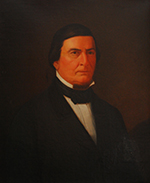 Theodore H. McCaleb served as a federal trial judge for almost 20 years, including a term in the unified District of Louisiana and separate terms in both the Eastern and Western Districts of Louisiana. He was born into privilege on Cold Springs Plantation in Claiborne County, Mississippi, on February 10, 1810. He was educated at Phillips Exeter Academy in New Hampshire and Yale University, and "read law" in Massachusetts from 1830 to 1831. He assumed his brother's law practice in 1832 in New Orleans, where he married Agnes Bullitt McCaleb and had five daughters and a son.
Theodore H. McCaleb served as a federal trial judge for almost 20 years, including a term in the unified District of Louisiana and separate terms in both the Eastern and Western Districts of Louisiana. He was born into privilege on Cold Springs Plantation in Claiborne County, Mississippi, on February 10, 1810. He was educated at Phillips Exeter Academy in New Hampshire and Yale University, and "read law" in Massachusetts from 1830 to 1831. He assumed his brother's law practice in 1832 in New Orleans, where he married Agnes Bullitt McCaleb and had five daughters and a son.
An active member of the Whig Party, he was nominated to the federal bench in Louisiana by President John Tyler on September 1, 1841, and received his commission two days later. As a judge in New Orleans, he presided over several important cases, including issuing a significant decision concerning the breadth of federal admiralty and maritime jurisdiction that was ultimately affirmed by the United States Supreme Court. From 1850 to 1851, Judge McCaleb presided over the sensational criminal trials of General Narciso Lopez, who had been indicted for violation of the United States Neutrality Law of 1818 as a "filibusterist" for his leadership of an unsuccessful military expedition from the United States to liberate Cuba from Spain and make it an American territory or state. General Lopez was tried before a jury three times, with each trial ending in a hung jury and eventually the quashing of the indictment. A plaque commemorating General Lopez's efforts to "liberate" Cuba now stands on Poydras Street near the main entrance to the Eastern District courthouse.
Judge McCaleb was also a member of the original faculty of the Tulane Law School, then known as the University of Louisiana, where his title was Professor of Admiralty and International Law. According to Paul Brosman in Volume 32 of the Tulane Law Review, Judge McCaleb hosted "[t]he first Tulane law lecture . . . at seven o'clock in the evening of December 6, 1847, in [his] Customs House federal courtroom" in a "public event . . . attended . . . by numerous lawyers and other townspeople as well as by members of the entering class of the newly established law department." Judge McCaleb was "accomplished as an orator and public lecturer." One of his notable speeches was his address at the dedication on December 18, 1849, of the New Orleans Lyceum, an organization that promoted independent community education outside a formal educational setting. Judge McCaleb was an intimate friend of some of the most distinguished people of his times, including Alexis deToqueville, William Makepeace Thackeray, and United States Senator Henry Clay, whose memorial service upon his death included Judge McCaleb as its featured speaker.
Judge McCaleb resigned his federal judgeship on January 28, 1861, upon Louisiana's secession from the Union. According to Nathaniel C. Hughes in Yale's Confederates: A Biographical Dictionary, Judge McCaleb had "decided to throw in his lot with the Confederacy." He died at the Hermitage Plantation in Claiborne County, Mississippi, on April 29, 1864, where he is interred in the family cemetery.
